While Australia makes much of its human rights standards in international dialogues, its own track record is variable to say the least – human rights concerns around the Northern Territory intervention, detention of asylum seekers, and Aboriginal deaths in custody are a just a few examples that come to mind.
The latest attempt to better enshrine human rights in this bedraggled history is the Attorney General’s Department review of human rights in Australia and the development of a national “Plan of Action”.
The draft plan, circulated for comment until tomorrow, seeks to lay out Australia’s human rights priorities. But it fails on many counts to address fundamental change in Australia’s legal framework for human rights.
All about image
The plan comes in part as an attempt to resurrect Australia’s international profile after the keelhauling Australia received at the UN Human Rights committee’s Universal Periodic Review (UPR) held in Geneva last year.
The UPR is a new process where member states get to present their story and are then interrogated over their perceived failures. While the committee contains many countries that Australians would find questionable as human rights arbiters, it is perhaps their own capacity to conceal their record on human rights that allows them to see through attempts by others to do the same thing.
Australia is one of the few western liberal nations without an overarching legal framework for human rights, a matter well-recognised and roundly-criticised in the Geneva interrogations.
Flaws and all
The plan to address human rights in Australia is a fascinating, though fundamentally flawed, document. It has to overlook the fact that the Government refused to act on the Brennan report on human rights, which suggested a slow approach but nevertheless some focused movement on putting legislation in place.
The plan also reflects a weird representation of the jurisdictional priorities of Australia. Those of the national government and Victoria are well represented in the plan, but none of the other states or territories rate a mention – it appears NSW was not even asked to provide a submission. It is as though the thin coverage from Canberra will have to do for everyone except citizens of the Garden State, who have special needs for which detailed initiatives in every area are explicitly listed.
Legal roundabouts
One of the areas about which the international community expressed particular concern was Australia’s reservations on article 4a of the International Convention for the Elimination of all Forms of Racial Discrimination.
The article commits state parties to criminalise race hatred, including hate speech. Australia reserved its position in 1967, arguing that it would need agreement from all states, and that the article interfered overly with freedom of speech.
In lieu, the Racial Discrimination Act 1975 was later amended in 1996 to outlaw hate speech, but only through a tortuous process of civil action by the offended party.
The first use of this provision, by the Jewish community against the Holocaust denial site of the Adelaide Institute, took 13 years to reach conclusion, without a satisfactory outcome as the offensive material was taken over by another publisher.
The latest case involves Andrew Bolt and the Herald Sun, whose vilification of Indigenous leaders was found proven, but no remedies have yet been agreed.
Seen to be doing something
There is a long track of remarkably similar outcomes when Australian governments have been pressed to take tough action to protect human rights but have not had “the ticker” to do so. For example, the Multiculturalism Act in the early 1990s, the Racial Vilification Act in the mid 1990s, and most recently the 2009 Human Rights Act.
An alliance rapidly emerges to counter any legislative push, usually sponsored by one of the right wing think tanks, free speech advocates, libertarians, conservatives, political opportunists and privilege protectors. All of these groups try to demonstrate that there will be no popular support for any such move.
The rage voiced by opponents of human rights legislation when Andrew Bolt was held to have breached the Racial Discrimination Act’s vilification provisions is a mild indication of much more deeply rooted hostilities.
Hollow promises
In the past, the government of the day has always gone to water, doing a deal that retains symbolic commitment but reduces the likelihood of any improvement in the capacities of the most vulnerable victims to protect themselves, all the while announcing it as great progress.
The danger in the draft plan as it stands is that many of the current human rights provisions are slated for review, potentially providing cover for a process that will reduce the already limited protections that Australians have, rather than improve the situation.
Human rights protections for citizens in Australia already compare poorly with our counterparts in the US, UK or Canada; we can’t let it get any worse.

